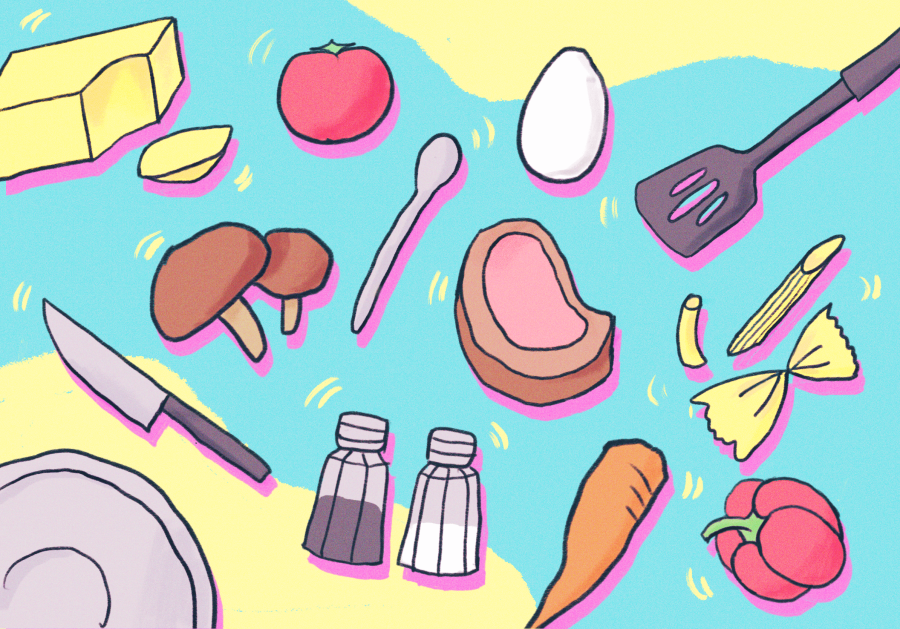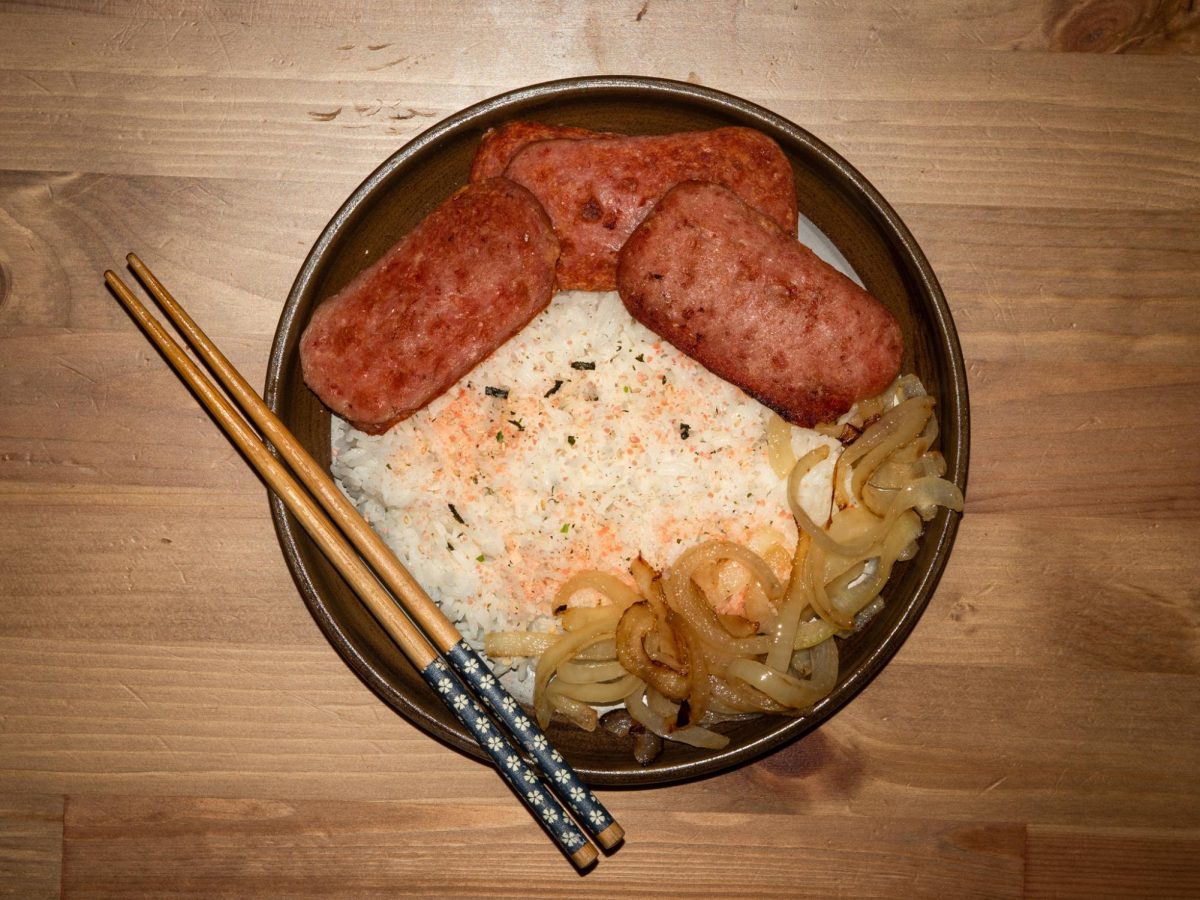Those who tuned in to my takeover of The UCSD Guardian’s Instagram story may have noticed several posts of aesthetic, home-made meals. While I am by no means a chef, my roommate is admittedly a huge foodie: She regularly watches Bon Appetit, follows celebrity chefs, and bookmarks the latest recipes. Back in pre-quarantine life, on the off-chance that she had enough free time to actually cook, I would swoop by the kitchen and casually mooch off of whatever delicacy she had made. It was the truth of our friendship that she was the one who cooked and I was the one who ate.
But with quarantine, things changed. I could no longer depend on Trader Joe’s conveniently pre-packaged (and perishable) salads, or wander over to Price Center for a quick bite between classes. Whereas I used to get home from a long day of school and work around 9 p.m., lacking any energy or motivation to cook, I was suddenly home for normal meal hours. I now had to plan out my meals in advance and responsibly calculate how long I could go before restocking my non-perishables. I’m slightly ashamed to say that quarantine is what finally motivated me to join my roommate in the kitchen, but it’s true.
Growing up, I had always resisted cooking, even when I got to college and became completely responsible for feeding myself. Food caused me extreme anxiety. My 16-year stint as a hardcore ballerina contributed to binge eating disorder, which turned into bulimia nervosa, which then devolved back into binge eating disorder. I hated anything having to do with preparing food, or even allocating portions, because it involved a level of self-control I myself did not possess. I either ate way too much or way too little. One extreme or the other — no in-between.
My lack of self-control was ironic. The whole point of ballet is to teach discipline, commitment, and perseverance — qualities which, at least in the eyes of my peers, family, and friends — I seemed to embody. Everyday, I spent hours in front of the studio mirror, repeating the same exercises over and over, and focusing only on what I could do better. I forced my body into extreme, unnatural positions without caring if I hurt myself. I broke some toes, sprained my ankle, deteriorated my right hip flexor, and permanently deformed my feet. But I liked ballet, and I did it all without a second thought. I kept reminding myself that reward only came with hard work. And in ballet, “hard work” meant putting yourself through the extremes. Giving anything less than my all implied that I was just being lazy and unappreciative. A little bit of pain was completely normal.
The better I got at ballet, the higher I set my standards. I spent summers doing intensive training programs at different studios around the Bay Area and molded myself to meet each studio’s high expectations. My personal line between discipline and perfectionism, however, began to blur. If I fell out of a pirouette or failed to get my développé at anything less than a perfect 180 degrees, I punished myself after class by eating as much food as possible. I told myself that if I couldn’t fit in my leotard anymore, it was proof that I didn’t deserve to be a ballerina. I binged and gained 25 pounds. Soon enough, I actually didn’t fit in my leotard. I could no longer look at myself in the mirror.
I thought I could repair my relationship with ballet by taking more relaxed dance classes in college, but once I got here, I still couldn’t break my association between punishment and the studio. After a lot of thinking, I traded my dance minor for a psychology minor and enrolled in a class called the “Psychology of Eating Disorders.” Although I know that learning about personal mental health struggles is not necessarily the healthiest thing for everyone, taking the class helped me process what I was personally going through.
The class emphasized that eating disorders are stereotypically seen as an issue predominantly impacting young, white, heterosexual, middle-class females — as I happen to be — because white women are statistically more likely to seek and have access to treatment. People of color and individuals in the LGBTQ community, on the other hand, often face unique barriers to accessing treatment and are less likely to report symptoms due to systemic issues such as cultural stigma and health care discrimination. Cost of treatment and access to health insurance act as further economic obstacles. While mainstream media may commonly depict eating disorders as being a “skinny white woman issue,” eating disorders affect people of all races, sizes, genders, and socioeconomic backgrounds. Learning about the scope and effects of different eating disorders from an empirical standpoint helped me see that recovery was an achievable goal.
My eating disorder recovery finally began at the start of this school year, and I am glad to say that I have made significant strides toward recovery since then. I was fortunate to receive treatment, and everything was going smoothly, at least until COVID-19.
Quarantine presents a myriad of unique challenges that affect everyone on different levels, some more so than others. I am extremely fortunate to not have the worries other students do during this time. I still live in San Diego, I can still walk to the grocery store, and I can still graduate on-track. I don’t take any of it for granted.
When the stay-at-home order was announced, my roommate and I went to the grocery store and stocked up on non-perishable foods. I started to panic. It seemed so stupid to worry about my eating disorder amidst something as serious as a global pandemic.
But cooking with my roommate was a big deal for me. It was the first time I ever really allowed myself to use a kitchen, or attempt to reclaim any sort of control over food. I had previously only eaten pre-packaged foods so I wouldn’t lose control, binge, and then lapse. I was absolutely terrified of making my own food because I knew I would feel anxiety, shame, and disgust once I inevitably over-ate. It was just easier to eat things that were already made.
It’s only been a few weeks, but I’m slowly and steadily learning how to reclaim control over food. My roommate is incredibly supportive and she constantly encourages me to involve myself in our cooking — sometimes she’ll politely remind me that someone needs to make the rice, or she’ll refuse to chop the veggies and lovingly force me to do it. We’ve been cooking foods that remind us of family — her family is Persian, and my family is Turkish — and doing our best to experiment with new cuisines. I’m learning how to view food as a source of nourishment instead of as a means of hurting myself.
As my colleague Jacob Sutherland wrote in his own piece for the Quarantine Chronicles, this pandemic presents a unique opportunity to engage in some self-reflection. I’m lucky to even have access to food when so many people do not, and I’m lucky to be able to dedicate my time to putting energy into fixing my relationship with myself. I realize that not everyone has the privilege of using this global pandemic to do the same.
I’m putting my energy into healing and re-assessing what I value and why. Now, whenever I cook, I remember that I have control over more of my life than I think.
I breathe and remember that I am more than okay.
Graphic by Angela Liang.














